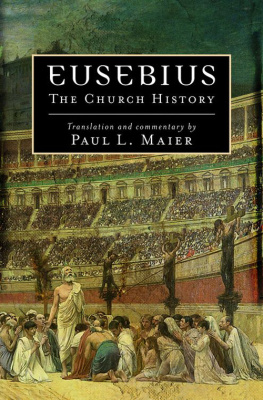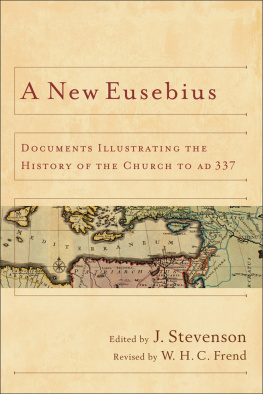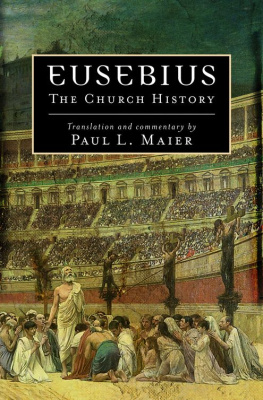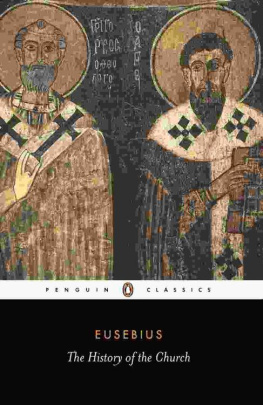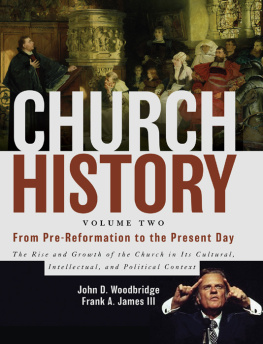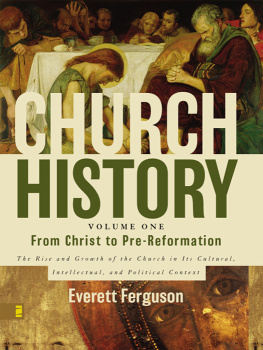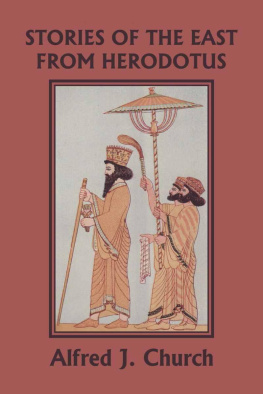Paul L. Maier - Eusebius: The Church History
Here you can read online Paul L. Maier - Eusebius: The Church History full text of the book (entire story) in english for free. Download pdf and epub, get meaning, cover and reviews about this ebook. year: 2012, publisher: Kregel Academic, genre: Religion. Description of the work, (preface) as well as reviews are available. Best literature library LitArk.com created for fans of good reading and offers a wide selection of genres:
Romance novel
Science fiction
Adventure
Detective
Science
History
Home and family
Prose
Art
Politics
Computer
Non-fiction
Religion
Business
Children
Humor
Choose a favorite category and find really read worthwhile books. Enjoy immersion in the world of imagination, feel the emotions of the characters or learn something new for yourself, make an fascinating discovery.
- Book:Eusebius: The Church History
- Author:
- Publisher:Kregel Academic
- Genre:
- Year:2012
- Rating:4 / 5
- Favourites:Add to favourites
- Your mark:
- 80
- 1
- 2
- 3
- 4
- 5
Eusebius: The Church History: summary, description and annotation
We offer to read an annotation, description, summary or preface (depends on what the author of the book "Eusebius: The Church History" wrote himself). If you haven't found the necessary information about the book — write in the comments, we will try to find it.
Eusebius: The Church History — read online for free the complete book (whole text) full work
Below is the text of the book, divided by pages. System saving the place of the last page read, allows you to conveniently read the book "Eusebius: The Church History" online for free, without having to search again every time where you left off. Put a bookmark, and you can go to the page where you finished reading at any time.
Font size:
Interval:
Bookmark:

FICTION
The Flames of Rome
More Than a Skeleton: It Was One Man Against the World
Pontius Pilate
A Skeleton in Gods Closet
NONFICTION
The Best of Walter A. Maier (ed.)
Caspart Schwenckfeld on the Person and Work of Christ:
A Study of Schwenckfeldian Theology at Its Core
The Da Vinci Code: Fact or Fiction? (with H. Hanegraaff)
EusebiusThe Church History (ed., trans.)
First Christians
First Christmas
First Easter
In the Fullness of Time
JosephusThe Essential Writings (ed., trans.)
JosephusThe Essential Works (ed., trans.)
JosephusThe Jewish War (ed., trans. with G. Cornfeld)
A Man Spoke, a World Listened
Martin Luther: A Man Who Changed the World
The New Complete Works of Josephus (ed.)
Eusebius: The Church History
Copyright 1999, 2007, 2011 by Paul L. Maier
Kregel Digital Editions is an imprint of Kregel Publications,
P.O. Box 2607, Grand Rapids, MI.
Use of this ebook is limited to the personal, non-commercial use of the purchaser only. This ebook may be printed in part or whole for the personal use of the purchaser or transferred to other reading devices or computers for the sole use of the purchaser. The purchaser may display parts of this ebook for non-commercial, educational purposes.
Except as permitted above, no part of this ebook may be reproduced, displayed, copied, translated, adapted, downloaded, broadcast, or republished in any form including, but not limited to, distribution or storage in a system for retrieval. No transmission, publication, or commercial exploitation of this ebook in part or in whole is permitted without the prior written permission of Kregel Publications. All such requests should be addressed to: rights@kregel.com
This ebook cannot be converted to other electronic formats, except for personal use, and in all cases copyright or other proprietary notices may not modified or obscured. This ebook is protected by the copyright laws of the United States and by international treaties.
To the faculty of Concordia Seminary
in appreciation
for their conferral
of the degree of
Doctor of Letters, honoris causa
s
If Herodotus is the father of history, then Eusebius of Caesarea (c. A.D . 260339) is certainly the father of church history. He was the first to undertake the task of tracing the rise of Christianity during its crucial first three centuries from Christ to Constantine. Since no other ancient author tried to cover the same period, Eusebius is our principal primary source for earliest Christianity, and his Church History is the cornerstone chronicle on which later historians would build. The Jewish historian Flavius Josephus provides fascinating addenda to our information about the people, places, and events of the biblical world, and Eusebius does the same for the period up to A.D. 324.
What happened to Jesus apostles later in life? Did Simon Peter ever go to Rome? Where did John spend the rest of his days? Did Paul survive his trial before Nero? When were the Gospels written ? Who wrote them, and where? How did the New Testament canon develop? Why and how were the early Christians persecuted ? These questions and many more involve an era no longer covered by the New Testament and could hardly be answered were it not for Eusebius.
The ten books of his Church History are a treasure trove of data on the fledgling faith, whose survival and purity were sorely tested by persecution without and heresy within. Today Christianity is the most successful single phenomenon, statistically considered, in all of history. During its early years, however , it was fragile, fragmented, harried, tortured, and seemingly doomed by a hostile Roman Empire. Equally destructive were the internal attacks by renegade religionists who tried to seduce the saints through arcane distortions of doctrine or corral them into schismatic groups that foreshadowed contemporary cults.
Eusebius tells it all, but he also reports the heroic stance of the martyrs, whose blood indeed became the seed of the church, as Tertullian put it. Eusebius writes of the fearless defenders of the faith who had the courage to face emperors and face down heretics, of bishops and elders who guided the church through horrendous adversity, and of writers whose crucial statements preserving orthodoxy would in many cases have been lost had Eusebius not reported them word for word. These pages, then, show how Christianitys tragedies turned into triumph in the course of its first three centuries.
Eusebius in Greek means one who is reverent, pious, or devouta proper name (nearly equivalent to Pius in Latin) that was shared by a half dozen other famed figures in Christian history . A geographical suffix distinguishes them from one another. Just as Jesus ofNazareth differentiated him from the twenty other Jesuses in biblical times, so Eusebius ofCaesarea designates the church historian.
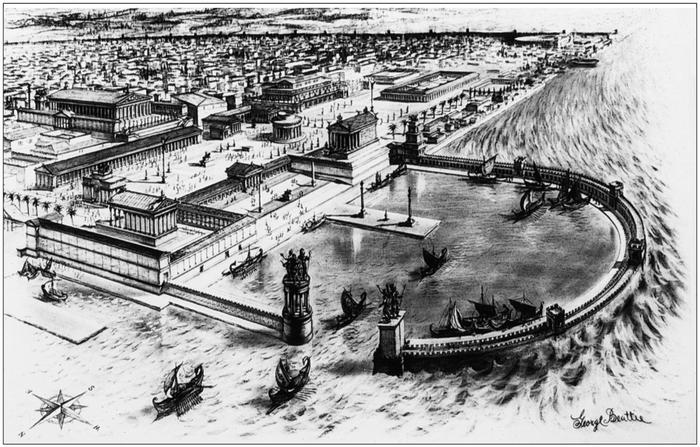
Ancient Caesarea, looking toward the southeast. Herod the Great constructed the city in the years 25 to 13 B.C. , including the semicircular seawall opening to the north (GeorgeBeattie).
Although there were also a number of Caesareas in antiquityall named in honor of Augustus, the first Roman emperorEusebiuss is Caesarea Maritima, the famous city of Palestine constructed by Herod the Great on the Mediterranean shore, at a site previously called Stratos Tower. This Caesarea is mentioned frequently in the New Testament as the Roman capital of Judea, the headquarters of Pontius Pilate, Cornelius, Herod Agrippa, Felix, and Festus, as well as the place where Paul was imprisoned for two years. Here, too, the riot broke out in A.D . 66 that led to the great Jewish War against Rome and the destruction of Jerusalem. The last only enhanced the importance of Caesarea, and by the third century it was virtually the capital of Syria, a very large, cosmopolitan city with a Jewish, Greek, Samaritan, and Christian populace.
Eusebius was probably born around 260. His biography, written by Acacius, his successor as Bishop of Caesarea, has not survived to provide more exact detail. His ancestry and the story of his youth are unknown. His education may be adduced from the fact that the great Eastern scholar-theologian Origen spent his later years in Caesarea, dying several years before Eusebius was born. Origens influence persisted strongly in the theological school founded there by the learned Pamphilus, presbyter in the church at Caesarea, who taught Eusebius and influenced him most. Eusebius joined Pamphilus in writing a defense of Origen, made use of his great library, and wrote a Life of Pamphilus (now lost), whom he valued so highly that he was often known as Eusebius Pamphili. In the final Great Persecution of the Christians under Diocletian, Pamphilus was imprisoned and martyred in 310.
Upon the death of his mentor, Eusebius went to Tyre in Phoenicia and Alexandria in Egypt, where he was imprisoned in the Diocletianic persecution but released shortly afterward. Many years later an opponent accused him of having gained his release by pagan sacrifice, but no evidence for this was adduced at the time or since. Had such evidence existed, it surely would have been used in the theological turmoil of the day. Just after Constantines edict of toleration was issued in 313, Eusebius was elected Bishop of Caesarea, where he remained until his death, despite being offered (and declining) the patriarchate of Antioch in 331.
Font size:
Interval:
Bookmark:
Similar books «Eusebius: The Church History»
Look at similar books to Eusebius: The Church History. We have selected literature similar in name and meaning in the hope of providing readers with more options to find new, interesting, not yet read works.
Discussion, reviews of the book Eusebius: The Church History and just readers' own opinions. Leave your comments, write what you think about the work, its meaning or the main characters. Specify what exactly you liked and what you didn't like, and why you think so.

